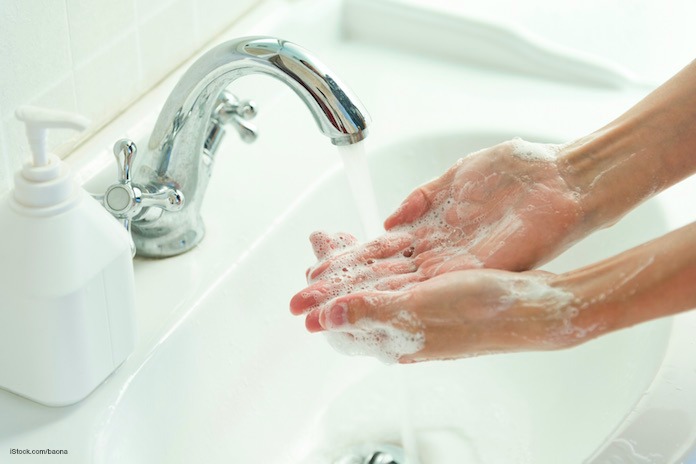Coronavirus is the big news these days: the virus is circling the globe, infecting thousands of people and may expand to pandemic proportions. Experts are giving great advice on how to avoid the virus. So what does that have to do with a site that focuses on food poisoning? There is one thing that prevention of coronavirus and food poisoning have in common: Wash your hands!

There is no vaccine to prevent a COVID-19 infection. And there are no vaccines to prevent infection from Salmonella, Campylobacter, E. coli, Listeria monocytogenes, and Staphylococcus aureus. The best advice from experts is to wash your hands thoroughly and frequently to prevent transfer of viruses and bacteria to others.
So do you know how to wash your hands properly? Here’s the gist: Wet your hands under warm running water, add some soap, whether it’s liquid soap or a bar doesn’t matter. Lather up and rub your hands together vigorously. Make sure you get between your fingers and under your fingernails. Lather to a count of at least 20 seconds – that’s the “Happy Birthday to You” song sung twice, in your head or out loud, doesn’t matter. Rinse your hands thoroughly with warm water and dry them well with a clean towel or paper towels. Teach your kids how to do this too.
While coronavirus is spread through droplets from a cough or a sneeze, which can get on your hands, food poisoning is spread through the fecal-oral route, that is, tiny bits of poop contaminate your hands after using the bathroom or changing a diaper. Those pathogens will transfer to food or surfaces if you don’t wash your hands properly. In either case, it’s pretty easy to contaminate your hands and spread the germs if you aren’t paying attention to personal hygiene.
This message of proper and through handwaving also applies to people who work in food service, for those who work in the food processing industry, for those who harvest our food, and for those who transport it. And of course, anyone preparing food for anyone else, whether it’s at a fancy restaurant or at home, should always always work with clean hands.
And did you know that you should wash your hands after handling raw meats and poultry? And if you blow your nose or touch your face or cough into your hand? And after you use the bathroom? After treating a cut or wound? After touching an animal? After handling garbage? All of those activities could transfer bacteria or viruses to your hands, and then when you touch something else the pathogens will transfer to those surfaces.
Experts also say that hand sanitizers and wipes can help if you don’t have access to soap and water, but that soap and water is the best choice for avoiding illness. Soap contains surfactants, which are chemicals that attach to and lift soil and microbes from your skin. And the scrubbing action also removes dirt from the skin, as does drying with a towel.
Oh, and remember that antibacterial soaps, even though they sound good, should not be used. The FDA issued a rule in September 2016 that 19 ingredients in antibacterial soaps are no more effective than plain soap and water. Those antibacterial ingredients are no longer marketed to the general public.




